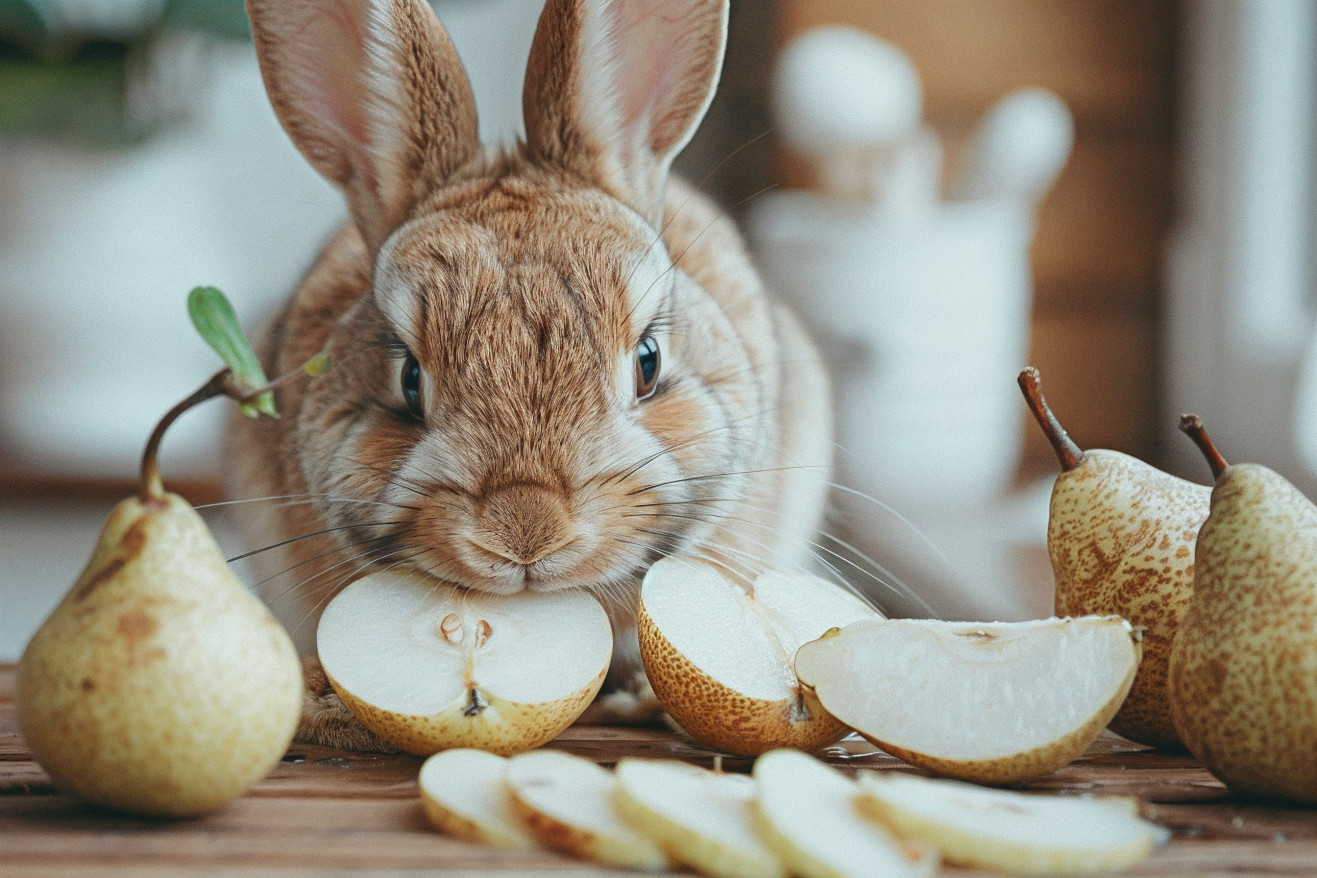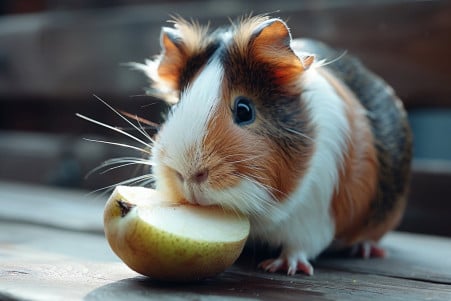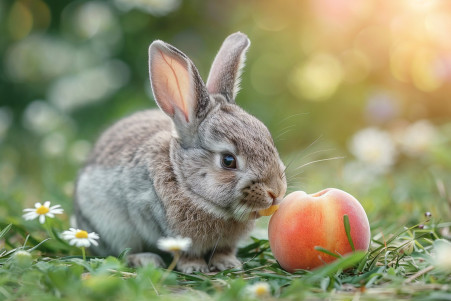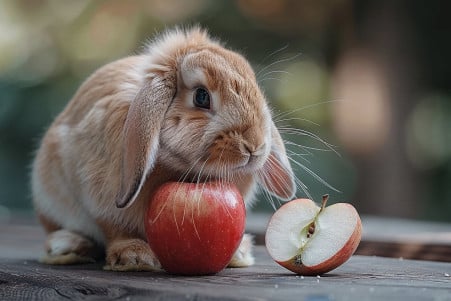Can Rabbits Eat Pears? A Nutritional Guide
21 April 2024 • Updated 21 April 2024

Rabbits can eat a variety of fruits, but you may be wondering if pears are among the fruits that are safe for your bunny to eat. Pears are safe for rabbits to eat in moderation and can be a healthy part of a balanced diet, providing important nutrients like vitamin C and fiber. However, pears should be fed to rabbits without the seeds and stem, which can pose a choking hazard, and in small amounts as an occasional treat.
To better understand whether pears are a good choice for your pet rabbit, we'll take a closer look at the advice of veterinary nutritionists and rabbit experts. By reviewing information from scholarly journals and experienced rabbit parents, we'll cover the potential benefits and drawbacks of feeding pears to rabbits. This evidence-based assessment will help you decide whether or not to feed your pet rabbit pears and, if so, how to do it in a way that's safe and healthy.
Can rabbits eat pears?
Why a Rabbit's Diet Is So Important
Rabbits are herbivores, and their digestive systems are designed to process a very specific type of diet. A healthy rabbit diet is centered around high-fiber hay, which should make up approximately 80% of a rabbit's diet. Fresh vegetables are also important and should make up about 10% of an adult rabbit's diet. Pellets can be included in a rabbit's diet, but they should be limited to prevent obesity.
While pears and other fruits can offer some nutritional benefits, they are also high in natural sugars. Because of this, fruits should make up less than 5% of a rabbit's daily caloric intake to prevent obesity and other digestive issues. A diet that's not properly balanced and includes too many of the wrong foods can definitely lead to health problems for rabbits.
When it comes to adding new foods to a rabbit's diet, including pear treats, it's important to remember that rabbits need a varied diet. As VCA Animal Hospitals explains, "Introducing new foods too quickly or feeding inappropriate foods can disturb the rabbit's normal digestive flora and cause illness." This is why it's important to feed rabbits treats in moderation and to introduce new foods slowly so their digestive systems can adapt.
By making sure your rabbit's diet is based on unlimited hay, supplemented with fresh vegetables and very limited amounts of fruit and pellets, you can make sure your rabbit is getting the fiber and other nutrients they need. Pears can be a healthy treat for rabbits as long as they are added to a diet that's already balanced.
Nutritional Benefits and Risks of Pears for Rabbits
Pears can offer rabbits a number of important nutrients, including water, fiber, and vitamins such as vitamin C. Per rabbits.life, "Rabbits are allowed to eat 1-2 teaspoons of pears per 2 pounds of body weight." That said, pears are also high in sugar, so they should be given in small amounts and only as an occasional snack.
One important note is that pear seeds and stems contain small amounts of cyanide, which can be harmful to rabbits. Rabbit Hole Hay Eating Guide warns, "Do not feed your rabbit pips." While the flesh of the pear is safe for rabbits to eat, the seeds and stems must be removed before giving it to your pet.
It's also important to make sure to introduce pears to your rabbit's diet gradually and to watch for signs of digestive upset or allergies. Per rabbits.life, "Fruits can lead to serious health problems, so avoid feeding him pears or other fruits on a daily basis." It's important to make sure that you're feeding your rabbit pears in moderation, as overconsumption can lead to issues like obesity, diarrhea, and more.
Moderation and Frequency of Pear Treats
The recommended serving size of pear for rabbits is 1-2 teaspoons per 2 lbs of body weight, according to ExoticDirect. Rabbit Care Tips suggests that adult rabbits should be given pear treats no more than once or twice a week. Baby rabbits under 12 weeks old should not be given any fruits or vegetables, as their digestive systems are still developing.
Serving sizes should be adjusted based on the rabbit's age, weight, and other dietary factors. BeChewy recommends a maximum of 1 leveled tablespoon of fruits and non-leafy green vegetables per 2 pounds of body weight per day. Pay close attention to your rabbit's response and be ready to adjust serving sizes as needed if you notice any digestive upset.
How to Feed Pears to Your Rabbit
Because rabbits have sensitive digestive systems, it’s important to introduce new foods, including pears, to their diet slowly. According to Small Pet Select, it takes 2-4 weeks for a rabbit’s GI tract to fully adjust to a new food.
This means you should start by feeding your rabbit small amounts of pears and then gradually increase the amount you give them. Watch your rabbit for any signs of digestive upset. Burgess Pet Care notes that it’s best to only introduce one new food at a time so that you can be sure that your rabbit doesn’t have any adverse reactions. In general, it’s best to be patient and give your rabbit plenty of time to adjust to a new food.
Overall, the best diet for rabbits includes a variety of foods, including hay, vegetables, and a small amount of fruit. By slowly introducing new foods, you can make sure that your rabbit safely enjoys pears and other healthy foods.
More Fruits and Veggies That Are Safe for Rabbits
In addition to pears, there are several other fruits that rabbits can eat in moderation. According to The Spruce Pets, these include berries such as blackberries, blueberries, and raspberries, as well as melons such as cantaloupe and watermelon. Citrus fruits such as kiwi and pineapple can also be given to rabbits on occasion.
When it comes to vegetables, leafy greens and crunchy options are important parts of a rabbit's diet, as they provide fiber and other important nutrients. As with pears, it's important to introduce new fruits and vegetables to your rabbit's diet slowly and one at a time to make sure they don't cause any digestive problems. Oxbow Animal Health notes that fruits with pits or seeds, such as peaches and cherries, should be avoided because they can contain small amounts of toxins.
A healthy diet for rabbits includes a mix of hay, vegetables, and a small amount of fruit. According to Bunny Meadow, pears are a safe and well-tolerated option for rabbits. By taking a slow, cautious approach to introducing new foods, you can make sure that your rabbit has a balanced, nutritious diet.
Conclusion: Pears Can Be a Healthy Treat for Rabbits
Pears can be a healthy addition to a rabbit's diet when they're fed in moderation. It's important to maintain a balanced diet that includes hay, leafy greens, and a small amount of pellets.
To avoid digestive issues, new foods should be introduced slowly, and rabbits should be monitored for any adverse reactions. A variety of fruits and vegetables can help ensure rabbits get the nutrients they need. For personalized dietary recommendations for your rabbit, consult a veterinarian.


